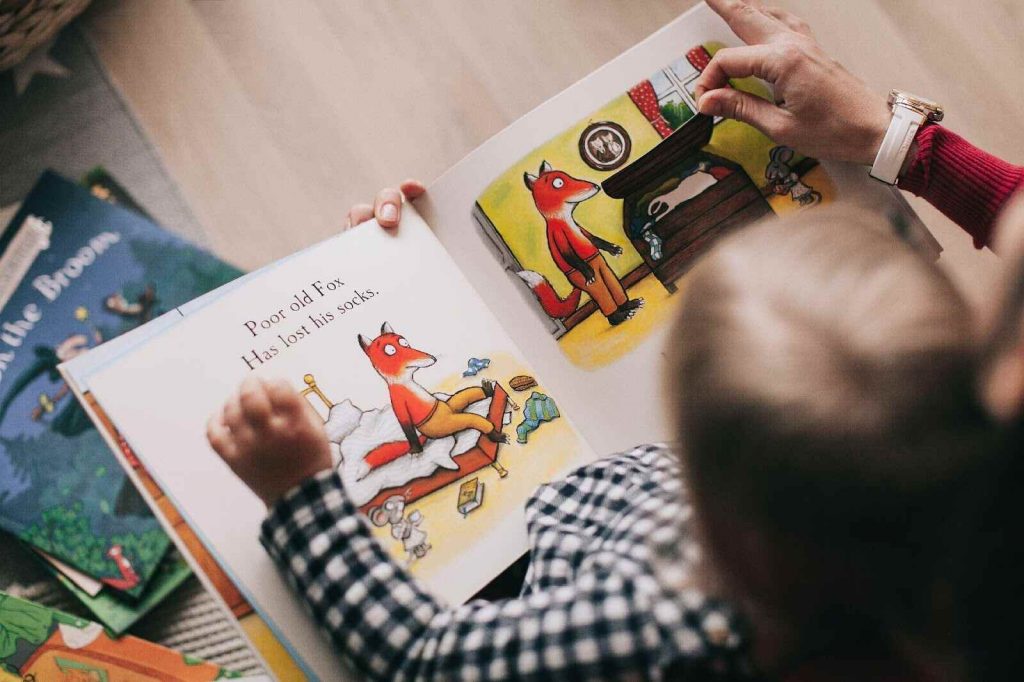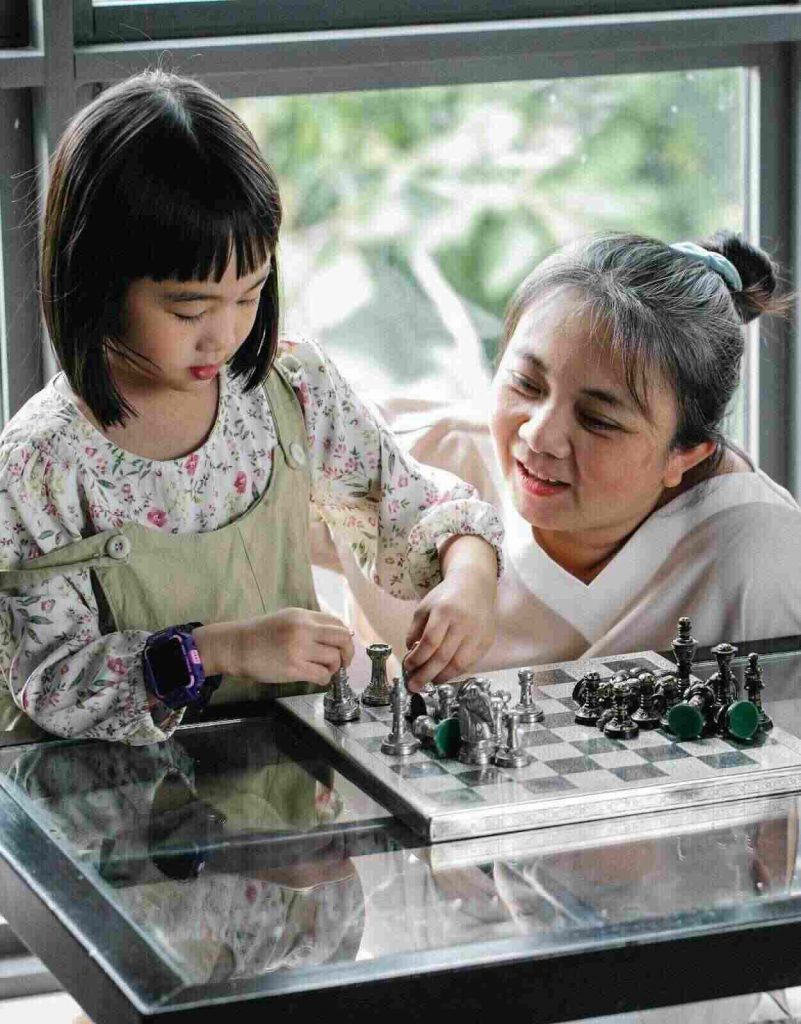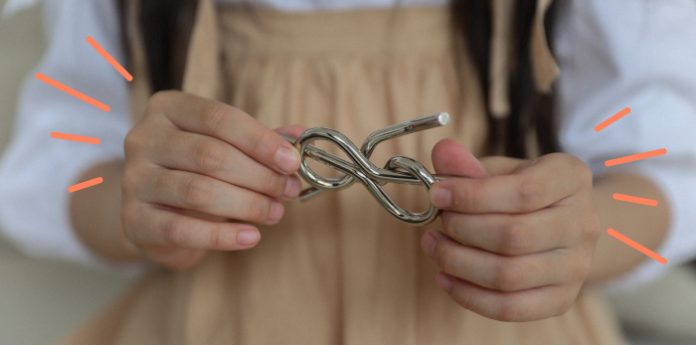Brain teasers for kids are the best way to challenge young minds and encourage them to think critically. Brain teasers, riddles, puzzles, and other activities that require lateral thinking help your child develop essential cognitive skills such as reasoning and logic.
Math & ELA | PreK To Grade 5
Kids see fun.
You see real learning outcomes.
Watch your kids fall in love with math & reading through our scientifically designed curriculum.
Parents, try for free Teachers, use for free
Young children are unable to grasp abstract concepts. However, they can learn at a young age how to decipher tricky brain teasers with the help of their parents. This is why it’s so important to keep them entertained with constructive activities like solving brain teasers and riddles.
What gives children a sense of accomplishment? Figuring out a tricky question or puzzle on their own is more satisfying than anything for them. They will be proud of themselves and want to solve more challenging problems as they grow up.
What are Brain Teasers for Kids?

A brain teaser is a kind of puzzle that requires thought to solve. It often requires critical thinking with given constraints in mind; sometimes, it involves lateral thinking. Logical puzzles require the solver to deduce the relationships among members of a set of items using a given set of conditions.
Brain teasers are a great way to keep children’s brains sharp and alert by challenging their thinking. They also help children see things from different perspectives, leading to creative solutions to problems.
20 Fun Brain Teasers for Kids

You might be surprised to learn that several brain teasers are just as effective as exercising your brain or helping you get smarter. These 20 fun brain teasers for kids can help children and adults better their logical thinking skills, boost their memory, improve attention to detail, and even strengthen problem-solving abilities.
Related Reading: What Do You Learn in 3rd Grade
5 Language Brain Teasers for Kids
Language brain teasers for kids are a great way to help children develop their ability to reason while having fun. In addition, they are an excellent vehicle for learning new words and expanding vocabulary.
- What is wrong with this sentence? “I know you are, but what am I?”
Answer: The quotation marks are facing in the wrong direction.
- There are five words in the English language that end in “dous.” Can you think of one?
Answer: Tremendous, hazardous, horrendous, stupendous, and hazardous.
- If a rooster lays an egg on top of a barn roof, which way will the egg roll off?
Answer: Roosters don’t lay eggs – hens do!
- How many letters are there in the English alphabet?
Answer: There are 11 letters in ‘THE ALPHABET’!
- What starts with an E and ends with an E but only has one letter?
Answer: An envelope.
5 Riddle-Based Brain Teasers for Kids
Kids love riddles. Riddles provide fun and help children learn to think and reason. When kids solve riddles, they are working on their deductive reasoning skills. Deductive reasoning helps us use clues to figure out the answers to questions and problems. This is an essential skill for later school success.
- You are driving a bus. At the first stop, two women get on. Three men get on at the second stop, and one woman gets off.
Two kids and their mom get on at the third stop, and four people get off. No one gets on at the fourth stop, and two people get off.
You are at your final stop. What is the name of the bus driver?
Answer: Yourself.
- I am an odd number. Take away one letter, and I become even. What number am I?
Answer: Seven.
- What’s black when it’s clean and white when it’s dirty?
Answer: A blackboard.
- What has four fingers and a thumb but is not living?
Answer: A glove.
- What has many keys but cannot open a single lock?
Answer: A piano.
5 Tongue Twisters
Tongue twisters are a great way to practice and improve pronunciation and fluency. It can also help to improve accents by using alliteration, which is the repetition of one sound. They can also help to improve vocabulary and understanding of grammar, as some tongue twisters require a specific construction to pronounce them correctly.
Tongue twisters are great for kids, as they are fun and make children laugh. Practicing tongue twisters with children will also help them develop their speaking skills.
- The big black bug bit the big black bear, but the big black bear bit the big black bug back!
- She sells seashells by the seashore. The shells she sells are surely seashells. So if she sells shells on the seashore, I’m sure she sells seashore shells.
- A bootless bootblack bought a bootblack brush to brush boots that are bound to be boot-blackened by bootblacks with brushes for brushing boots with.
- A tutor who tooted a flute tried to tutor two tooters to toot. Said the two to their tutor. Is it harder to toot or To tutor two tutors to toot?
- A good cook could cook as many cookies as a good cook who could cook cookies.
5 Math Brain Teasers for Kids
Math brain teasers are a great way to exercise your child’s brain while still having fun. They will be able to hone their logical thinking skills and problem-solving techniques with these types of puzzles.
Your child will also learn to think outside the box when solving math problems or puzzles in general. This type of activity is often referred to as “brain training” or “brain exercise” for children because it allows them to strengthen their minds by working through complex problems in an entertaining way.
- If you ran a race and passed the person in 2nd place, what place would you be now?
Answer: If you passed the person in 2nd place, you’d be in 2nd place. You passed the person in second place, not first. You could only be in the first place if you passed the person who was in the first place before the race started.
- Johnny’s mother had three children. The first child was named April. The second child was named May. What was the third child’s name?
Answer: Johnny.
- What is the highest number you can make with only two digits?
Answer: 99
- What can be seen once in a minute, twice in a moment, but never in an hour?
Answer: The letter ‘M.’
- A farmer had 15 sheep, and all but 9 died. How many are left?
Answer: 9
Related Reading: Strategies to Bring Out and Solidify Mindfulness For Kids
The Importance of Brain Teasers for Kids

Brain teasers have always been a source of fun for kids. It is a way to kill time and a great activity to help develop thinking skills in kids. Children love the challenge it brings, and the reward of solving a problem is like a dose of adrenaline that keeps them wanting more.
The goal of brain teasers is to test your child’s ability to think outside the box and help them increase their problem-solving skills, improve their critical thinking skills, and boost their memory. It has been shown that young students who regularly engage in brain teaser activities have higher levels of success in school than those who don’t.
It boosts creativity in young minds, increases concentration levels, develops problem-solving skills, improves short-term memory, reduces stress, etc.
4 Tips to Effectively Use Brain Teasers for Kids in the Classroom

Most people like to solve problems and face a challenge. If you can choose a brain teaser relevant to the course you teach, your students will be more interested in solving them.
When you use brain teasers for kids in the classroom, you give your students a chance to work on their problem-solving skills. These are skills that are not only good for school work but also for life in general.
1. Use brain teasers as a warm-up activity
Consider using a brain teaser as a warm-up activity to get your students into a class mindset and ready to start working. It is essential to choose one that is directly related to the subject matter of your course so that it gets your students thinking about the material in front of them.
2. Use brain teasers as a review
Another way that you can incorporate brain teasers for kids into your classroom is by using them as a review activity at the end of specific lessons or chapters.
3. Start with easy one’s first
This will help build confidence among your students and help them become comfortable with problem-solving, which can help them approach more demanding questions later on.
4. Use brain teasers as a reward or fun way to end the class
Many teachers like to do a 10-minute “fun” activity at the end of class once students have completed all their work or earned extra credit points. Brain teasers for kids are an excellent way to reinforce skills while still having fun!
Bottom Line

Brain teasers for kids are great because they work a wide variety of brain functions while also engaging students. No matter the subject material you cover in class, a brain teaser will fit somewhere.
On SplashLearn, you can find games, puzzles, and quizzes that stimulate the brain and are fun to play, covering the curriculum topics of your choice (math, reading, science).
In addition to these activities, SplashLearn offers a variety of other resources, such as videos, lessons, and exercises that teachers can use to enhance other subjects in the classroom.
Frequently Asked Questions
Why are brain teasers good for kids?
Brain teasers are suitable for kids because they strengthen problem-solving and critical thinking skills, encourage lateral thinking, and build new perspectives.
How do riddles help improve a child's memory?
Puzzles and riddles help exercise a child’s mind because they involve many mental tasks, including mathematics, logical reasoning, pattern recognition, and nonlinear thinking.
Do brain teasers for kids make them smarter?
Brain games such as puzzles, teasers, riddles, crosswords, and quizzes are marketed as easy and effective ways to expand your mind and increase intelligence.
How do brain teasers for kids work?
Brain teasers force the children to think of a general situation that does not happen in the workplace. As a result, the answers to brain teasers only measure how good the child is at coming up with quick and clever solutions to abstract problems under pressure.
























